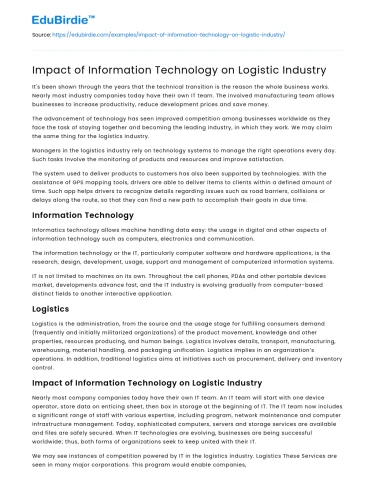It's been shown through the years that the technical transition is the reason the whole business works. Nearly most industry companies today have their own IT team. The involved manufacturing team allows businesses to increase productivity, reduce development prices and save money.
The advancement of technology has seen improved competition among businesses worldwide as they face the task of staying together and becoming the leading industry, in which they work. We may claim the same thing for the logistics industry.
Save your time!
We can take care of your essay
- Proper editing and formatting
- Free revision, title page, and bibliography
- Flexible prices and money-back guarantee
Managers in the logistics industry rely on technology systems to manage the right operations every day. Such tasks involve the monitoring of products and resources and improve satisfaction.
The system used to deliver products to customers has also been supported by technologies. With the assistance of GPS mapping tools, drivers are able to deliver items to clients within a defined amount of time. Such app helps drivers to recognize details regarding issues such as road barriers, collisions or delays along the route, so that they can find a new path to accomplish their goals in due time.
Information Technology
Informatics technology allows machine handling data easy: the usage in digital and other aspects of information technology such as computers, electronics and communication.
The information technology or the IT, particularly computer software and hardware applications, is the research, design, development, usage, support and management of computerized information systems.
IT is not limited to machines on its own. Throughout the cell phones, PDAs and other portable devices market, developments advance fast, and the IT industry is evolving gradually from computer-based distinct fields to another interactive application.
Logistics
Logistics is the administration, from the source and the usage stage for fulfilling consumers demand (frequently and initially militarized organizations) of the product movement, knowledge and other properties, resources producing, and human beings. Logistics involves details, transport, manufacturing, warehousing, material handling, and packaging unification. Logistics implies in an organization’s operations. In addition, traditional logistics aims at initiatives such as procurement, delivery and inventory control.
Impact of Information Technology on Logistic Industry
Nearly most company companies today have their own IT team. An IT team will start with one device operator, store data on enticing sheet, then box in storage at the beginning of IT. The IT team now includes a significant range of staff with various expertise, including program, network maintenance and computer infrastructure management. Today, sophisticated computers, servers and storage services are available and files are safely secured. When IT technologies are evolving, businesses are being successful worldwide; thus, both forms of organizations seek to keep united with their IT.
We may see instances of competition powered by IT in the logistics industry. Logistics These Services are seen in many major corporations. This program would enable companies, by the usage of capital from their first selection, including raw materials to their place in use, to improve their productivity in service. Companies often gain end-to-end clarification on their goods or raw materials through this method. In addition, logistics information systems can help businesses monitor company internal information by presenting estimates of supply prices, which determine how much more product can be bought. This function helps businesses to be more competitive by having outstanding lot sizes and lead times.
In order to be effective, logistics depend on good quality control throughout the supply chain. Such distribution departments are responsible for the purchase and timely transfer of products to their targets. Logistics management rely on sophisticated IT systems to keep up and track products from being produced in the warehouse to being distributed in retail outlets. The best way to effectively handle the distribution of the company within an enterprise is by an upswing of demand and the uncertainty surrounding companies. The IT specialists often come up with the best answer for your client, such as choosing the right items to the market or the perfect way to supply their goods. It is their task and they notify the logistics supervisors to pass details correctly.
Companies depend on transporting goods and are informed where the items mentioned are at all times. The business monitoring device allows customers to recognize that their delivery has not met its targets. Yet drivers for merchandise transport are really useful. Using GPS navigation tools, a driver may take the direction of driving concurrently to the location of their shipping. The new GPS tech also helps drivers to collect traffic details ahead of their planned travel path. When the path is blocked, you should suggest another road with fewer path. It is a major plus for the shipping needs of a business as industries are that when products fall within a certain amount of time.
Nevertheless, sometimes the products are big enough to meet the specifications to be shipped. We would also introduce a third-party logistics network that includes transport and storage for certain businesses. This is not shocking that corporations actually cannot continue to go without digital technologies nowadays.
Conclusion
In addition, virtually every organization today has its own information technology team. The involved manufacturing team allows businesses to increase productivity, reduce development prices and save money. This program would enable companies, by the usage of capital from their first selection, including raw materials to their place in use, to improve their productivity in service. Companies often gain end-to-end clarification on their goods or raw materials through this method.
References
- Humberto Coronado (May 15, 2013). Information Technology and Its Impact on the Logistics Industry. Retrieved on 02/05/2016 from http://onlinecareertips.com/2013/05/information-technology-and-its-impact-on-the-logistics-industry/
- foodprocessing (Sep 03, 2010). Logistics Q&A: How Technology Has Changed Logistics. Retrieved on 02/05/2016 from http://www.foodprocessing.com/articles/2010/027/
- emmansonemmanson (March 12, 2012). Role of Information Technology in Logistics and Supply Chain Management. Retrieved from https://emmansonme.wordpress.com/2012/03/12/the-role-of-information-technology-in-logistics-and-supply-chain-management/
- Lucas D. Introna (December 1991). The Impact of Information Technology on Logistics. Retrieved from https://www.researchgate.net/publication/235290663_The_Impact_of_Information_Technology_on_Logistics






 Stuck on your essay?
Stuck on your essay?

